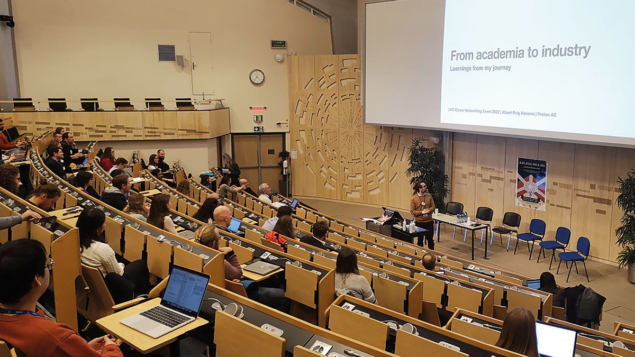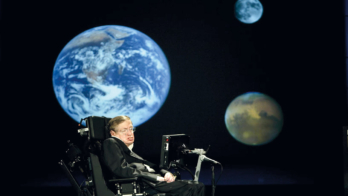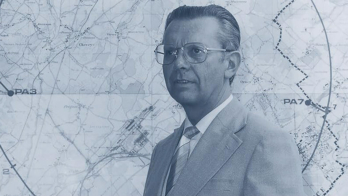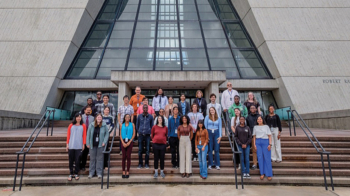The 2022 LHC Career Networking Event explored the diverse career paths on offer to physicists considering life outside academia. Shaun Roe reports.

The sixth annual LHC Career Networking Event, which took place at CERN on 21 November 2022, attracted more than 200 scientists and engineers (half in person) seeking to explore careers beyond CERN. Seven former members of the LHC-experiment collaborations and representatives from CERN’s knowledge transfer group discussed their experiences, good and bad, upon transitioning to the diverse employment world outside particle physics. Lively Q&A sessions and panel discussions enabled the audience to voice their questions and concerns.
While the motivations for leaving academia expressed by the speakers differed according to their personal stories, common themes emerged. The long time-scales of experimental physics coupled with job instability and the glacial pace of funding cycles for new projects, for example, sometimes led to demotivation, whereas the speakers found that industry had exciting shorter-term projects to explore. Several speakers sought a better work–life balance in subjects they could enthuse about, having previously experienced a sense of stagnation. Another factor related to that balance was the better ratio between salary and performance, and hours worked.
Case studies
Caterina Deplano, formerly an ALICE experimentalist, and Giorgia Rauco, ex-CMS, described the personal constraints that led them to search for a job in the local area, and showed that this need not be a limiting factor. Both assessed their skills frankly and opted for further training in their target sectors: education and data science, respectively. Deplano’s path to teaching in Geneva led her to go back and study for four years, improving her French-language skills while obtaining a Swiss teaching qualification. The reward was apparent in the enthusiasm with which she talked about her students and her chosen career. Rauco explained how she came to contemplate life outside academia and talked participants through the application process, emphasising that finding the “right” employment fit had meant many months of work with frequent disappointments, the memory of which was erased by the final acceptance letter. Both speakers gave links to valuable resources for training and further education, and Rauco offered some top-tips for prospective transitioners: be excited for what is coming next, start as soon as possible if you are thinking about changing and don’t feel guilty about your choice.
Maria Elena Stramaglia, formerly ATLAS, described the anguish of deciding whether to stay in academia or go to industry, and her frank assessment of transferable skills weighed up against personal desires and her own work–life balance. Her decision to join Hitachi Energy was based on the right mix of personal and technical motivation, she said. In moving from LHCb to data science and management, Albert Puig Navarro joined a newly established department at Proton (the developers of ProtonMail, which was founded by former ATLAS members; CERN Courier September/October 2019 p53), in which he ended up being responsible for hiring a mix of data scientists, engineers and operations managers, conducting more than 200 interviews in the process. He discussed the pitfalls of over-confidence, the rather different requirements of the industrial sector, and the shift in motivations between pure science and industry. Cécile Deterre, a former ATLAS physicist now working on technology for sustainable fish farming, focussed on CV-writing for industrial job applications, during which she emphasised transferable skills and how to make your technical experience more accessible to future employers.
With one foot still firmly in particle physics, Alex Winkler, formerly CMS, joined a company that makes X-ray detectors for medical, security and industrial applications; in a serendipitous exception among the speakers, he described how he was head-hunted while contemplating life beyond CERN, and mentioned the novel pressures implicit in working in a for-profit environment. Massimo Marino, ex-ATLAS, gave a lively talk about his experiences in a number of diverse environments: Apple, the World Economic Forum and the medical energy industries, to name a few. Diverting along the way to write a series of books, his talk covered the personal challenges and expectations in different roles and environments over a long career.
Throughout the evening, which culminated in a panel session, participants had the opportunity to quiz the speakers about their sectors and the personal decisions and processes that led them there. Head of CERN Alumni Relations Rachel Bray also explained how the Alumni Network can help facilitate contact between current CERN members and their predecessors who have left the field. The interest shown by the audience and the detailed testimonials of the speakers demonstrated that this event remains a vital source of information and encouragement for those considering a career transition.





